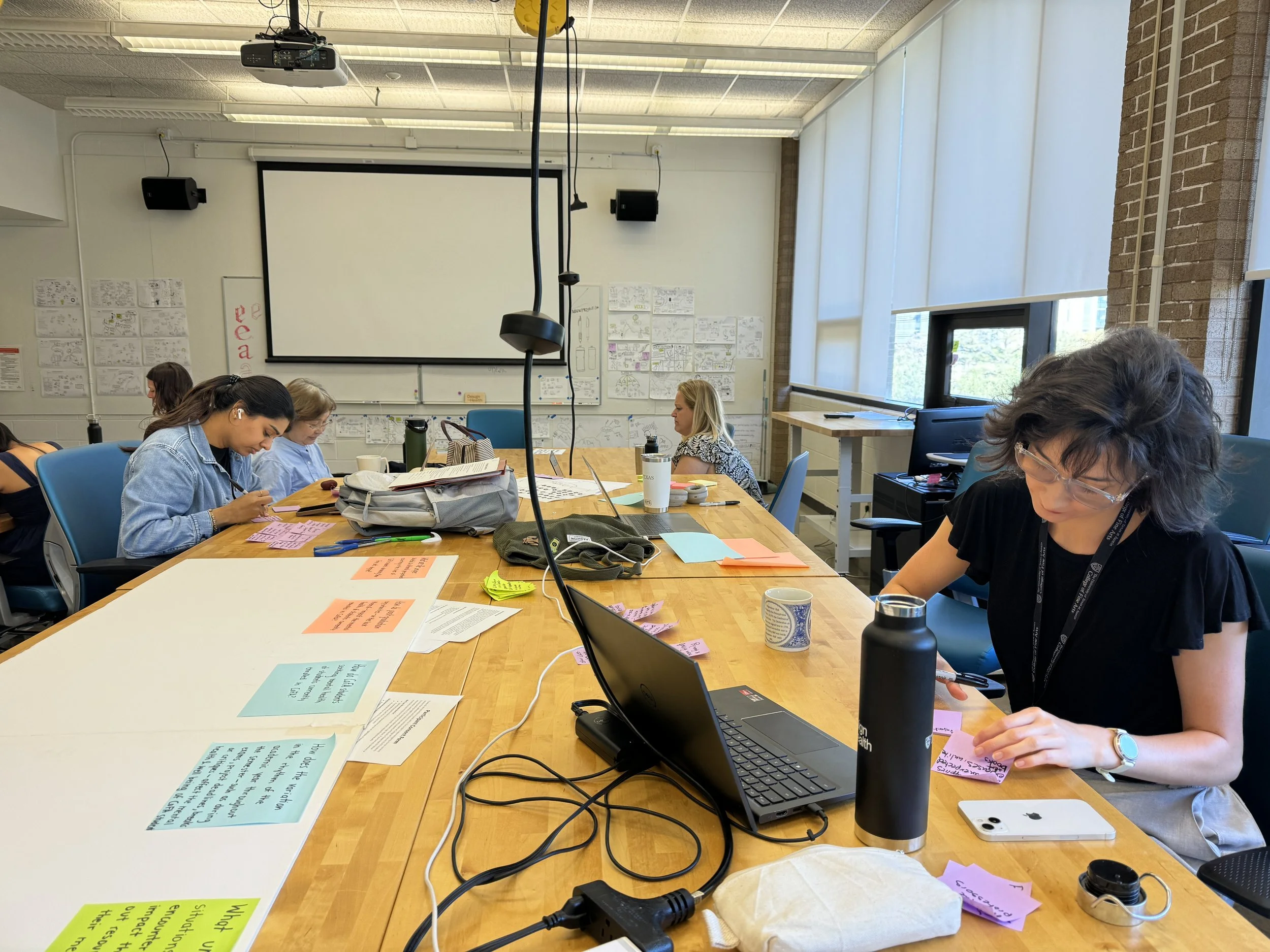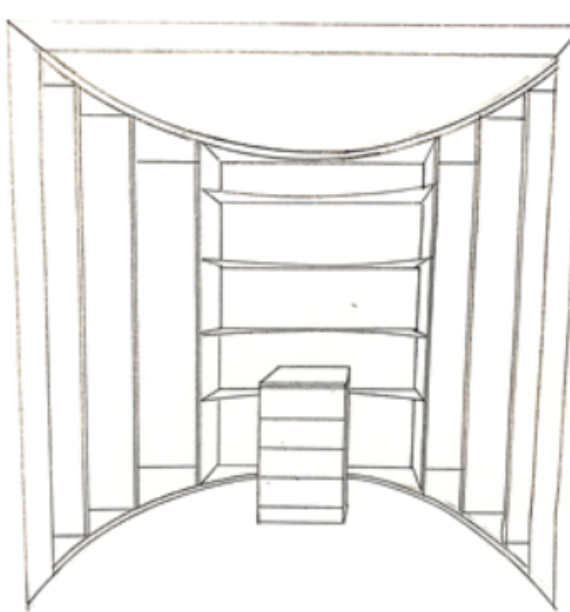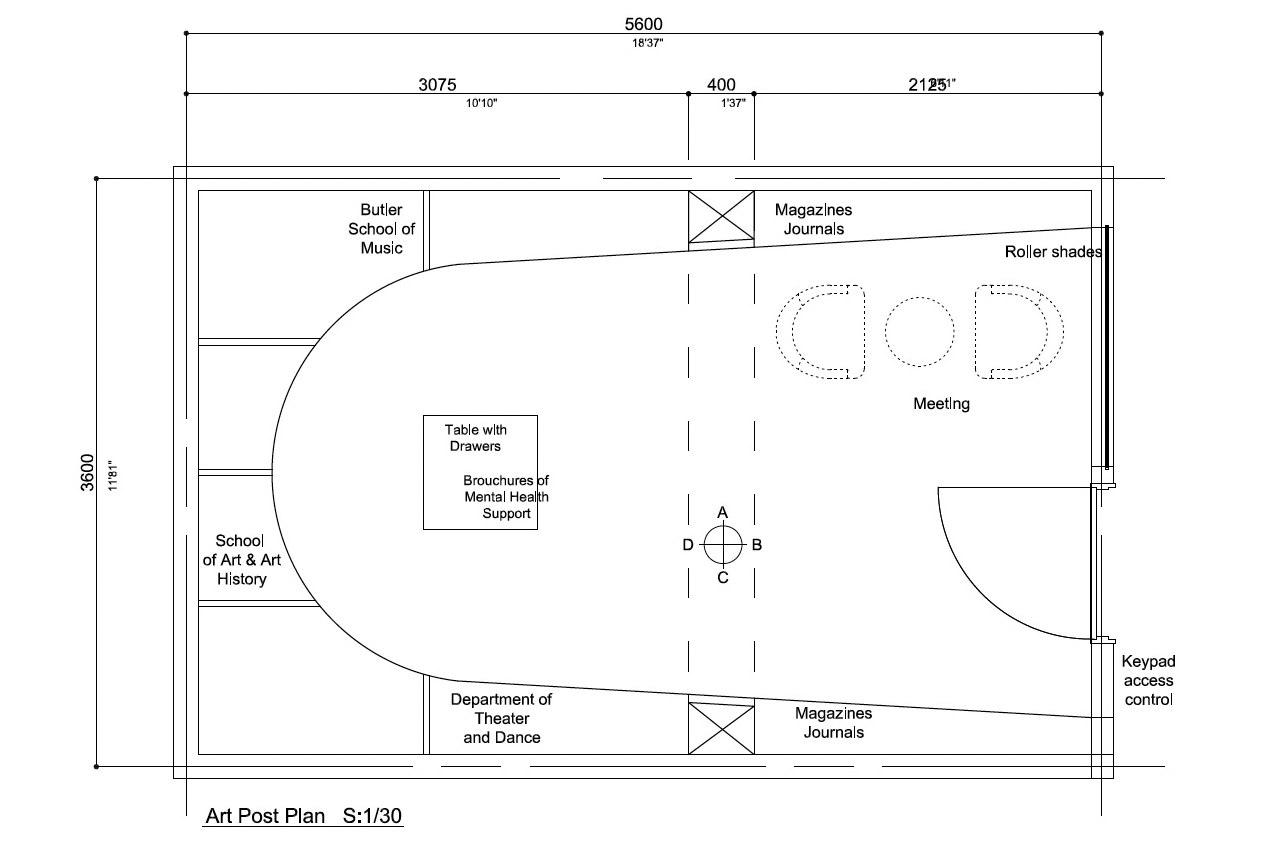The ArtPost
Bridging Support: Strengthening Mental Health in Fine Arts Education
By: CoFA Cares
Project Overview
Students in UT Austin’s College of Fine Arts (CoFA) navigate unique mental health challenges shaped by the creative intensity of their studies, financial strain, and limited support systems tailored to their needs. While UT offers mental health services, the lack of collaboration between HealthyHorns and CoFA leaves students without clear, accessible avenues for support. This project seeks to deepen our understanding of mental health among students in the College of Fine Arts (CoFA) at The University of Texas at Austin throughout the academic year. Using qualitative research methods and design, my team and I created The Artpost—an interactive, human-centered space that offers free donated art supplies to fine arts students. By reducing financial barriers to creative expression, The Artpost enhances student access to resources that support mental well-being.
Project Details
Organization - M.A in Design focused on Health, The University of Texas at Austin
Stakeholder - Healthyhorns at UT Austin
Team - Mariam Ahmed, Nuha Arefin, Sabrina Highfield, Fumiko Kokura, Leia Morris
Contributions - User and design research, graphic design, low-fidelity prototyping, interview facilitation
Timeline - 14 weeks (Fall 2024)
Discovery
Research Methods
Intercepts/In-depth Interviews
Conducted interviews with 20 students and 5 faculty members. The intercepts allowed us to rapidly interview students to better understand themes that run through the CoFA organization in terms of mental health. In-depth interviews gave us more insight on mental health and its relation to CoFA undergraduate students from diverse perspectives.
Deep Immersion
To better understand the student’s perspective, one of our teammates attempted to schedule an appointment with a CARE (Counselor in Academic Residence) Counselor over the phone. This exercise aimed to contextualize the user experience when seeking mental health support and resources from the university.
Research Samples
20 CoFA Undergraduates
5 Faculty Members
Research Goal: To understand and address mental health and well-being challenges among College of Fine Arts students at The University of Texas at Austin during the academic year and design a service to support their creative expression, and improve access to mental health resources.
Network Mapping
Have students place icons on a map showing the distance between themselves and mental health resources. This will help us identify patterns in how students approach mental health.
Analogous Study
My team and I visited Community First! Village, a nonprofit organization that provides housing for formerly unhoused individuals. Our goal was to explore the mental health resources and management strategies used by larger organizations to gain insights that could help improve support for CoFA students on campus.
C.A.R.E Counselor
Community First! Village
Define
Building Synthesis
My team and I identified patterns and created analysis from all the interviews to inform stronger design decisions. We categorized all the notes under various research questions to better construct our project insights.
Research Questions
What are the unique societal and cultural perspectives occurring in the lives of CoFA students obtaining their fine arts degree?
How does the variation in the rhythm of the academic year throughout the semester - such as during exams, project deadlines, or critiques - affect the students' mental health?
How do CoFA students seeking mental health interact with on-campus organizations such as UT counseling or MHC?
How do post-graduation opportunities - or the lack thereof - impact the mental health of students currently enrolled in CoFA?
What unique financial situations do CoFA students encounter, and how do these impact their ability to seek resources or care to offset their mental health?
Develop
Establishing Insight
How might we create a supportive mental health ecosystem for fine arts students that leverages professors' relationships
Concept Ideation
-
Classroom Check In (mental wellness assessment) - This will be a type of referral algorithm that measures students well being. If the student is at risk or in need of basic resources, the professor will reach out to the student and help navigate what resource will be most helpful for them.
-
Student ambassadors will hand deliver wellness kits to students homes at the request of a professor. The kit would include tools and resources that the student can use to support their mental health and wellbeing. The box would be customized to the students needs, but items within the box may look like:
journal
MH stickers with healthy horn info on them
Counselor/ambassador contact info
water bottle that has the Healthy Horns logo
essential oils
self-help books
snacks
socks
-
Graduating students are encouraged to donate any unused art supplies to the department, making them available for future students. Professors will introduce this donation program on the first day of class as part of their syllabus. Students who need supplies but may not be able to afford them can submit a request form to their professor. Once approved, they can borrow the needed supplies with a set return date. This program aims to support students by providing access to essential art materials.
Service Brief
Challenges
CoFA students and professors don't know about MH resources
Both are reluctant to refer to/utilize existing resources
Students end up leaning on professors when stressed but professors are not trained or equipped to handle them
Bridge
After selecting an insight and finalizing the CoFA Supply Upcycle concept, we developed a service brief that aimed to strengthen the student-professor relationship. The brief outlines how the Artpost will help reduce financial barriers students face when needing art supplies while also serving as an entry point for accessing mental health resources when needed.
Opportunity
CoFA professors have ongoing relationships with every CoFA student, and we can use their established relationships to keep tabs on who is struggling and deliver appropriate resources.
Design Principles
Comfort
Goals
Provide tangible support to CoFA students
Collect longitudinal data MH across CoFA classes and departments to inform future MH offerings
Inform students and professors of existing MH resources on campus
Increase trust and transparency between students and professors
Trust
Prototype
User Feedback
Illustrations by Nuha Arefin
Lessons Learned
Illustrations by Nuha Arefin
Delivery
The Artpost- Moments That Matter
Illustrations by Nuha Arefin
Donation - What is The Artpost?
The ArtPost is a donation system designed for individuals—such as professors, graduating seniors, and current students—who have accumulated art supplies over the years but no longer need them. Instead of letting these materials go to waste, they can be donated to the ArtPost. Additionally, we welcome CoFA alumni to participate, fostering a stronger sense of community and support within the arts.
The donation system brings the mindset of sustainability and easy accessibility so that students don’t have to travel long distances to an art store and spend lots of money on short-term courses.
Graphics by Mariam Ahmed
Introduction- How do students know about it?
During the first week of classes, professors introduce the ArtPost to students, explaining its purpose and significance. They highlight the resources available, emphasizing that it is more than just a place to obtain supplies—it also serves as a central, safe space that offers various mental health resources.
Each student will receive a postcard from the professor with a handwritten note summarizing key details about the ArtPost, its location, and how to request supplies. They will also get a small card listing campus mental health resources for easy access.
We chose an in-person introduction by the professor because our insights from Community First showed that residents seek support from familiar faces, like peers and regular counselors. This highlights the importance of community in building resilience.
FRONT
BACK
Graphics by Mariam Ahmed
Interaction - The Ticket Exchange
When students need supplies from the ArtPost, they can ask the professor after class or email them to request a ticket and arrange a pickup time. The ticket serves as proof of professor approval for access. Students give the librarian a small portion of the ticket and keep the larger part to complete the check-out survey.
Guided by our design principle of bridging the student-professor relationship, we prioritized in-person ticket exchanges to encourage conversation, build trust, and foster a sense of unity and support from faculty.
Graphics by Mariam Ahmed
Retrieval - The Space
This is the ArtPost plan. Designed for student comfort, the room is divided into Meeting Space and Storage Space.
In the Meeting Space, students can relax in comfortable chairs, read magazines, or chat. A blind offers added privacy if needed. A two perspective drawings is shown on the left
The Storage Space features a U-shaped shelf where students can pick art supplies. This curved design creates a sense of security and comfort. A perspective drawing is shown on the right
In the center, a square cabinet—shown in the mood board—holds well-being handouts from Healthy Horns, bridging art and wellness.
Meeting Space
Sketches by Fumiko Kokura
Storage Space
Inquiry - Checking Out
After their visit, students will complete a checkout survey via a QR code on their ticket.
This survey serves multiple purposes:
Keeps the conversation going – Professors are notified when students complete the survey, encouraging follow-ups and fostering connections for additional support, like resolving conflicts or finding campus resources.
Measures effectiveness – It tracks professor referrals, popular supplies, and student satisfaction.
The last two questions follow a Net Promoter Score format, gauging whether students would recommend ArtPost. This helps us understand its reputation and impact on the community.
Team (left to right) - Fumiko Kokura, Leia Morris, Sabrina Highfield, Nuha Arefin, Mariam Ahmed





































